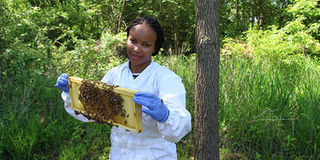Let’s match intent with action to boost food supply

Joan Kinyanjui is a beekeeper. PHOTO| FILE
What you need to know:
- Flower farms that had relocated to Ethiopia are now coming back to Kenya because of the political stability and good climate the country offers.
- As we step into 2019 with optimism and vigour, agriculture will continue to take pride of place in contribution to the national purse and taking care of the population.
- Higher taxation continues to discourage investment and needs urgent attention if we are to take the sector to the next level
When President Uhuru Kenyatta announced his Big Four Agenda soon after winning a second term, it was heart-warming that agriculture has been given priority in the plan alongside manufacturing, housing and health.
The agenda gave stakeholders in the agriculture sector good momentum this year. The industry continued to position itself not just as a front-runner in foreign exchange earnings but also a job creator.
Notably, the youth have warmed to farming, coming up with innovative ideas that have grabbed international headlines and attracted more to the sector.
Studies have indicated that in 2018, innovations in agriculture, including mechanised farming and investment in modern irrigation, continued to create more jobs.
Flower farms that had relocated to Ethiopia are now coming back to Kenya because of the political stability and good climate the country offers.
Therefore, we can conclude that agricultural stakeholders are playing their part in fulfilling the Big Four Agenda.
As we step into 2019 with optimism and vigour, agriculture will continue to take pride of place in contribution to the national purse and taking care of the population.
We look forward to matching intent with action, to walking the talk both as the government and the private sector players.
Flower farms that are returning to the country for example are bringing with them numerous investments and jobs. We need to address the reasons they left.
Higher taxation continues to discourage investment and needs urgent attention if we are to take the sector to the next level. The recent slapping of taxes on pesticides and related inputs should be relooked to lower the cost of production.
Delicate and volatile times
Young people who traditionally shied away from agriculture have shown enormous enthusiasm through transformative investment in agriculture. We call upon the government and private sector to invest in many more whose dreams and aspirations are enough to make the country produce more food.
We are in very delicate and volatile times. Our staple foods have been ravaged by some of the most devastating pests and diseases to have ever been witnessed in our country’s history including the fall armyworm, maize lethal necrosis disease and Tuta absoluta and lately, the false codling moth.
While traditional threats to agriculture have not fully been dealt with, the emergence of more vicious ones has thrown productivity into a spin, and should thus force policymakers and crop protection experts back to the drawing board.
Land is shrinking faster as population increases and climate change has totally altered growing seasons turning many parts of the country barren. We call on the government and sector players to commit more resources into research to prepare the industry for unforeseen challenges and forestall disruptions of production.
We are 12 years to 2030. A year in which the country envisions that it will reach mid-level economic status. A year we promised ourselves that there would be no more begging bowls, no hungry stomachs, and Kenya would be a land of plenty.
Major milestones
We have made major milestones especially in the agriculture sector and we continue to do more, but the movement is snail-paced. We cannot expect government alone to actualise this dream. This is a personal call to action.
In a country that has been classified by global institutions, including Food and Agriculture Organisation, and World Bank, as capable of being an agricultural supply station for the rest of Africa, we really should not be having a conversation about systemic hunger but rather how to ensure we are farming smart to not only cater for our people but transform the sector to allow more people earn from it.
A recent study indicated that one per cent increase in agricultural per-capita gross domestic product (GDP) reduced the poverty gap five times more than a one per cent increase in GDP in other sectors, especially among the poorest people. Another study demonstrated that for every 10 per cent increase in farm yields, there was a 7 per cent reduction in poverty.
Agricultural productivity can be increased, farmers’ incomes raised, more people fed and indeed, the general economic welfare enhanced. As a country blessed with a lot, we just need to match intent with action to drive agriculture to the status it rightly deserves.
The writer is the communications manager, Elgon Kenya





